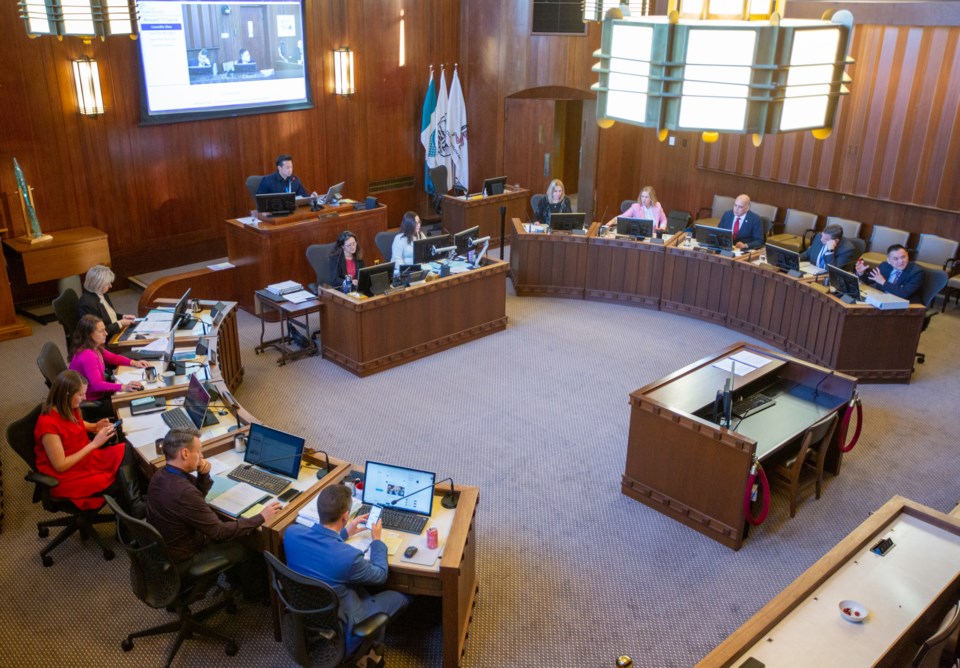Â鶹´«Ã½Ó³»city council will decide next week whether to roll back the five per cent "empty homes tax" rate to three per cent, as recommended in that emphasizes improving the "fairness and effectiveness" of the six-year-old policy.
In April 2022, the previous council approved increasing the rate from three per cent to five per cent for this year — the third increase since the tax was implemented in 2017 by the Vision Vancouver-led council.
The increase to five per cent was based on a motion from then-mayor Kennedy Stewart, who wanted to see a further return of empty and under-utilized properties to the market as long-term rental homes.
"The compliance rate is not where it should be," Stewart said when he introduced his motion. "If we can do this and run it for a year or so, we may be able to draw a line under speculation here in the city."
Stewart declined to comment on the staff report when reached Thursday.
Residential property owners are required to make a property status declaration every year to determine whether their property will be subject to the tax. The amount a homeowner pays is based on a property's assessed value.
As of Nov. 1, 2022, the tax generated more than $115 million in net revenue, which has been spent on affordable housing initiatives. The declaration period for 2023 is from mid-November 2023 until February 2024.
ABC Â鶹´«Ã½Ó³»now holds the majority on council and is led by Mayor Ken Sim, whose party said during last year's election campaign that it would continue to support the tax but wanted a review to better identify residents unintentionally captured by the policy.
Residents waiting for renovation or redevelopment permits were cited as examples.
The previous council requested such a review as part of Stewart's motion, with staff asked to investigate how exemptions might be altered to ensure owners with legitimate reasons for vacancy or having a second property wouldn't be penalized.
'Spike in false declarations'
The city hired EY Consulting Services, spoke to housing experts and the Urban Development Institute, and consulted with property owners about the "fairness and effectiveness" of the tax. Staff's analysis of the feedback was that the current five per cent rate should be rolled back to three per cent for 2023.
EY Consulting's report concluded the tax has had the desired impacts related to its initial policy objectives, in both reducing the number of vacant residential properties and raising money for affordable housing projects.
However, EY said increasing the tax rate beyond three per cent could "introduce some uncertainty as to whether these two outcomes will be more or less successful."
Further, EY concluded that "a five-fold rate increase in a tax based on a self-assessed declaration and whose integrity relies primarily on voluntary compliance might be expected to elicit a behavioural response that includes a spike in false declarations and a concurrent need for additional audit resources and activity."
"This, in turn, could result in an increase in downstream taxpayer complaints and legal disputes to resolve, consuming additional associated compliance and dispute resolution resources for both the city and taxpayers," the firm's report said.
'Generally, I love the tax'
Coun. Adriane Carr said Thursday she was unclear how EY concluded a five per cent rate would lead to a spike in false declarations. Carr said she planned to ask for an explanation at the May 10 council meeting.
"I'm interested in hearing the reasons why they think a leap to five per cent is going to have a deleterious effect — and that it's not going to give us any more revenue, and it's not going to return homes [to the rental market]," Carr said. "I don't understand that. It's a peculiar kind of conclusion to come to."
Carr said she favours a graduated tax rate scheme that penalizes repeat offenders, as staff said should be a consideration of council — the idea being a property vacant for a single year would start at a lower rate and increase if the property remains vacant for multiple consecutive years.
"Generally, I love the tax," she said. "It has proven to be very effective, both in returning units and returning revenue, which we use to build units that are secure market rental."
In addition to the request to roll back the tax to five per cent, staff also recommended a series of amendments to existing exemptions related to renovation, redevelopment and strata rental restrictions.
Uninhabitable properties, vacant new properties and residences occupied by people for medical treatment purposes were also flagged for clearer exemptions under the tax, with real estate market conditions taken into account for owners unable to sell.
The city staff report said approximately 160 fewer properties were declared vacant between 2020 and 2021. Between 2021 and 2022, another 130 fewer properties were declared vacant.
"Although the three per cent tax may have had an impact on the reduction of vacant properties, the significant and unprecedented COVID-19 pandemic may also be a major contributing factor in the decreasing trend in vacant properties in these years," the report said.
Condominiums lead vacant properties
The city released an annual report last fall on the empty homes tax that said the purpose of the tax was working, with the number of vacant properties decreasing by 36 per cent from 2017 to 2021.
The Canada Mortgage Housing Corporation also observed a significant shift toward long-term rental in Â鶹´«Ã½Ó³»following the introduction of the tax, with an increase of 5,920 condominium units in the long-term rental stock between their surveys in 2018 and 2019.
The city's annual report said that most exempt and vacant properties were condominiums, accounting for 56 per cent of combined exempt and vacant properties. The largest number of these properties were in downtown Vancouver.
West Point Grey, the West End and Shaughnessy recorded the highest percentage of unoccupied properties relative to the number of homeowners in these neighbourhoods who were required to declare, according to the annual report.




